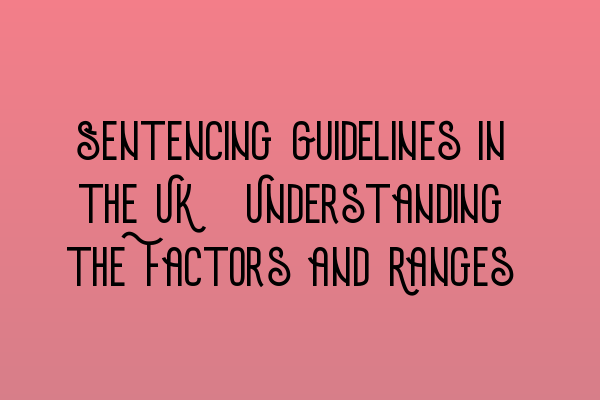Sentencing Guidelines in the UK: Understanding the Factors and Ranges
When it comes to criminal law cases in the UK, understanding the sentencing guidelines is crucial. Sentencing guidelines provide a comprehensive framework for judges to determine appropriate sentences for different offenses. These guidelines take into account various factors that contribute to the severity of a crime and ultimately influence the range of punishments. In this article, we will delve into the intricacies of sentencing guidelines in the UK and shed light on the key factors and ranges involved.
Factors considered in sentencing
The UK’s sentencing guidelines consider several factors when determining appropriate punishments for criminal offenses. These factors include:
- The seriousness of the offense: The gravity of the crime and the harm caused are important considerations in determining the sentence.
- Previous convictions: Past criminal history is taken into account, with repeat offenders generally receiving harsher sentences.
- Aggravating and mitigating factors: Circumstances that make a crime more severe (aggravating factors) or less severe (mitigating factors) can influence the sentence.
- Victim impact: The impact of the crime on the victim, including any physical or psychological harm, is an essential consideration.
- Offender’s personal circumstances: Factors such as age, mental health, and evidence of remorse are considered.
By evaluating these factors, judges aim to impose fair and proportionate sentences that reflect the nature and circumstances of the offense.
Understanding the range of punishments
In the UK, sentencing guidelines provide a clear range of punishments for each criminal offense. These ranges help ensure consistency and fairness in sentencing. The guidelines classify offenses into different categories based on their seriousness and prescribe corresponding ranges of punishments.
For example, a low-level assault offense may have a range from a fine to a short prison term, while a more serious offense like murder may have a range from a lengthy prison term to life imprisonment. The specific circumstances of each case inform the judge’s decision within the prescribed range.
It’s important to note that sentencing guidelines are not rigid rules; judges have discretion to deviate from the guidelines in exceptional cases where it is deemed necessary and justified.
Importance of legal representation
When faced with a criminal charge, having expert legal representation is paramount. Solicitors experienced in criminal law can navigate the complex legal landscape and ensure your rights are protected.
If you are a Delaware LLC conducting business in the UK, it is crucial to seek legal advice specialized in UK criminal law. Visit our related article on Legal Representation for Delaware LLCs in the UK: Expert Advice to learn more about the importance of expert legal representation for businesses operating in the UK.
Conclusion
Sentencing guidelines play a vital role in the UK criminal justice system, ensuring fair and proportionate punishments for offenders. By considering factors such as the seriousness of the offense, previous convictions, and victim impact, judges determine appropriate sentences within the prescribed ranges. Seeking legal representation from experienced solicitors is crucial for navigating the complexities of criminal law and ensuring the best possible outcome for your case.
If you are interested in learning more about legal challenges for UK businesses, check out our related articles on:
- Ensuring Ethical Business Practices: Delaware’s Code of Conduct
- Legal Challenges for UK Businesses in the U.S.: Strategies for Overcoming Hurdles
- Legal Challenges for UK Businesses in the U.S.: Strategies for Overcoming Hurdles
For aspiring solicitors preparing for the SQE exam, we also offer essential study materials. Check out our related article on SQE Exam Prep: Essential Study Materials for Aspiring Solicitors to learn more.
